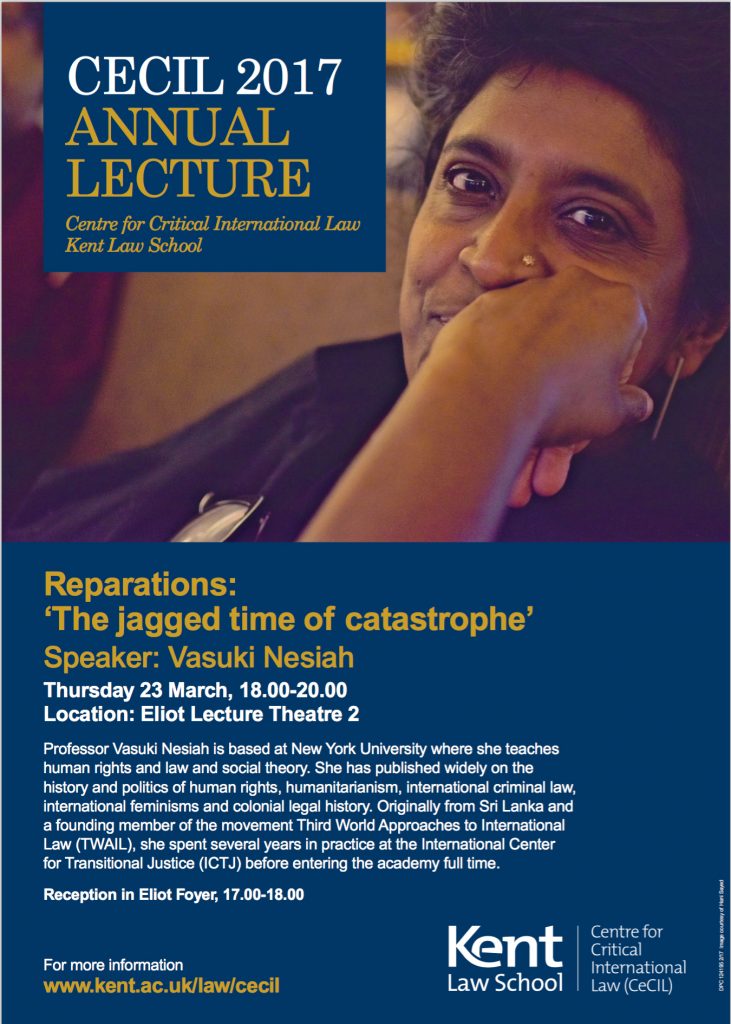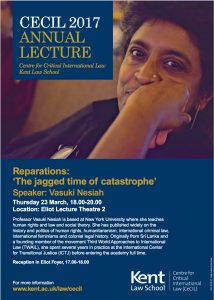Public international law scholar Professor Vasuki Nesiah from New York University will offer a critical re-examination of the issue of reparations when she delivers the Centre for Critical International Law’s annual lecture at Kent on Thursday 23 March.
In her talk, entitled ‘Reparations: The jagged time of catastrophe’ Professor Nesiah will suggests new perspectives for a discussion of reparations by looking again at claims made throughout history.
Professor Nesiah said: ‘The Magistrate, the official custodian of justice and the rule of law in J M Coetzee’s Waiting for the Barbarians, confesses that “I am the same man I always was; but time has broken.” The call for reparations is a call for recognition that time has broken – that it has fragmented and accumulated differently across history and geography in constituting our subjectivity. It is a recognition that we are located “not in the smooth recurrent spinning time of the cycle of the seasons but in the jagged time of rise and fall, of beginning and end, of catastrophe.” International law often claims the mantle of justice by dressing the jagged time of catastrophe as the smooth cycle of seasons. This paper is part of a larger project rethinking that narrative and exploring how we may reframe the discussion of reparations by examining reparations claims across different historical contexts, from proximate human rights abuses to the legacies of slavery and colonialism.’
The talk will begin in Keynes Lecture Theatre 2 (KLT2) at 6pm and will be preceded by a reception in Keynes Foyer from 5pm.
Professor Nesiah teaches human rights, law and social theory at NYU. She also teaches at Harvard Law School’s Institute for Global Law and Policy (IGLP), delivering summer and winter workshops in Cambridge, Doha, and Capetown. Her main areas of research include the law and politics of international human rights and humanitarianism, with a particular focus on transitional justice. Her past publications have engaged with international feminisms and the history of colonialism in international law. She has also written on the politics of memory and comparative constitutionalism, with a particular focus on law and politics in South Asia. Her most immediate project includes a volume which she co-edited with Dr Luis Eslava from Kent Law School and Michael Fakhri, A Global History of Bandung and Critical Traditions in International Law (Cambridge University Press, 2016).
She is one of the founding members of the Third World Approaches to International Law (TWAIL) and spent several years in practice at the International Center for Transitional Justice (ICTJ), where she worked on law and policy issues in the field of post-conflict human rights.
Professor Nesiah has been brought to the UK by the Centre for Critical International Law (CeCIL) at Kent Law School in collaboration with the London School of Economics and the Transnational Law Institute at King’s College London. CeCIL is an innovative research centre which aims to foster critical approaches to the field of international law, and other areas of law that touch upon global legal problems.
In addition to an annual lecture, CeCIL offers a programme of activities for Kent Law students. The Centre also organises workshops designed to engage scholars based at other institutions, and strives to engage students, scholars and practitioners interested in the critical study of international law around the world through developing collaborations and joint research efforts.
Current and past activities of the Centre have focused on key themes in critical international legal scholarship, including the production of victimhood in and through international legal frameworks and interventions, and economic and social rights in the neoliberal age.


